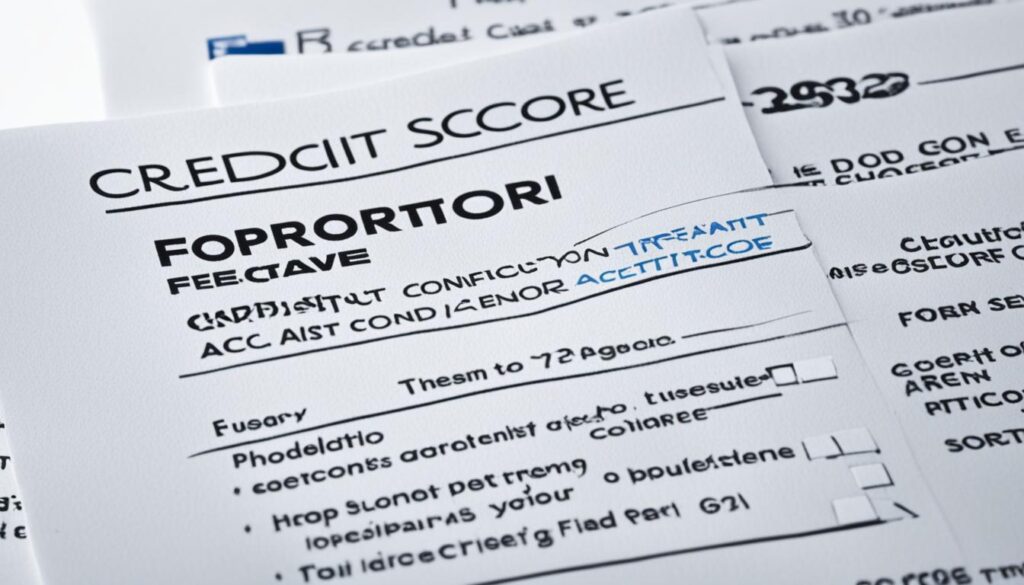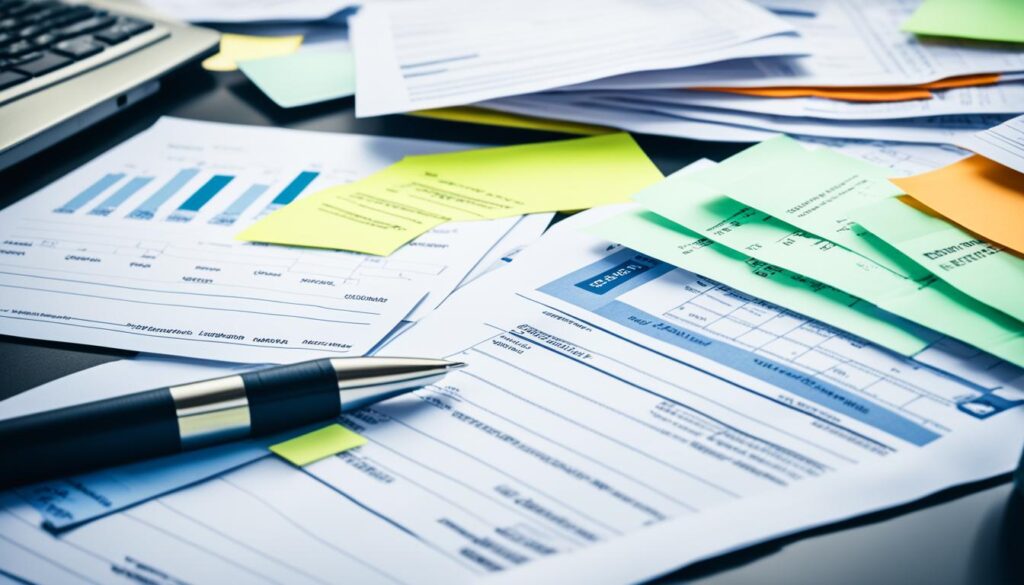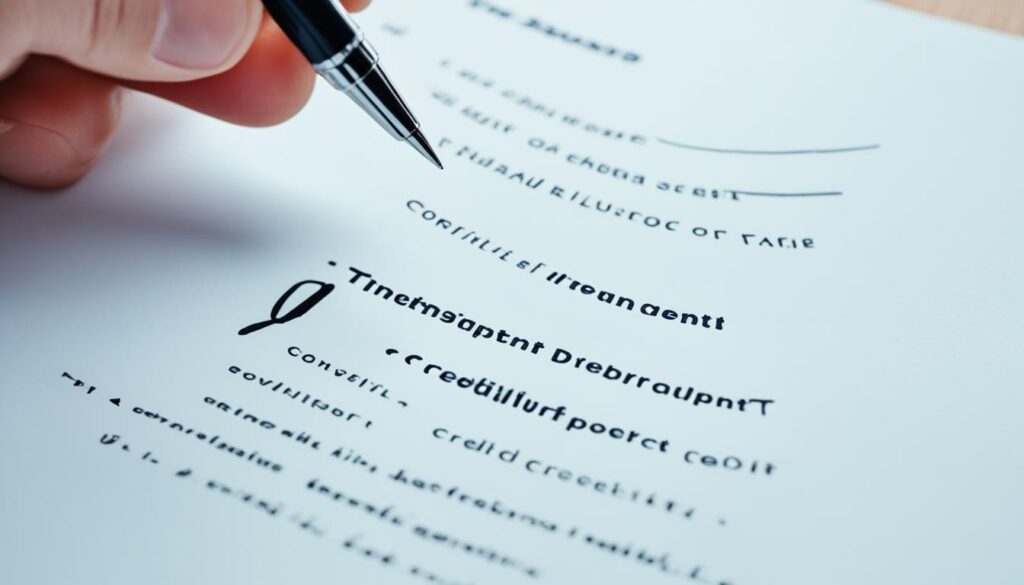Fixing your credit might seem overwhelming. But don’t worry! This guide will help you remove disputes from your credit report. We’ll show you how to improve your credit score and remove negative items.
Our practical steps will make credit repair easier. You’ll learn to spot errors and file disputes with credit bureaus. We’ll also teach you how to follow up effectively.
Understanding your credit report is crucial for handling disputes. This guide will give you tools to clean up your report. You’ll be able to boost your financial health in no time.
Key Takeaways
- Learn to identify errors on your credit report
- Understand your rights under the Fair Credit Reporting Act
- Follow a step-by-step process to file disputes
- Discover strategies to remove negative items
- Find out how to improve your credit score after dispute resolution
- Know when to seek professional help for credit repair
Understanding Credit Reports and Disputes
Credit reports are vital to your financial life. They contain your credit history, which lenders use to make decisions. Let’s explore credit reports and disputes to help you fix credit for free.
What is a credit report?
A credit report is a record of your credit history. It includes information about your accounts, payments, and public records. Equifax, Experian, and TransUnion compile these reports.
Common reasons for credit report disputes
People often dispute credit report errors for various reasons:
- Incorrect personal information
- Accounts not belonging to you
- Outdated negative items
- Inaccurate payment history
If you find any issues, you can dispute errors under your FCRA rights.
Impact of disputes on your credit score
Disputing errors can greatly affect your credit score. Removing negative items or fixing mistakes often improves your score. Different disputes can impact your score in various ways:
| Dispute Type | Potential Impact |
|---|---|
| Removing incorrect late payments | +50 to +100 points |
| Deleting fraudulent accounts | +100 to +300 points |
| Correcting credit utilization | +20 to +50 points |
| Updating personal information | Minimal to no impact |
Knowing about credit reports and disputes helps you manage your financial health. Stay alert and fix errors quickly to keep a healthy credit score.
Your Rights Under the Fair Credit Reporting Act (FCRA)

The Fair Credit Reporting Act is a key consumer protection law. It gives you specific rights for your credit report and credit repair. Knowing these rights helps you manage your financial future.
The FCRA lets you dispute wrong info on your credit report. Credit bureaus must check these disputes within 30 days. They must remove unverified information from your report.
Here are some key FCRA rights you should know:
- Free annual credit reports from each major bureau
- Notification if information in your file has been used against you
- Access to your credit score (may involve a fee)
- Right to seek damages from violators
The FCRA limits who can see your credit report. Only those with a valid need can view it. This includes creditors, landlords, or employers with your okay.
This law protects your privacy and helps stop identity theft. Knowing your FCRA rights is key for good credit repair.
Using these rights ensures your credit report shows your true financial history. It’s a powerful tool for managing your credit.
Identifying Errors on Your Credit Report
Spotting credit report mistakes is vital for a healthy financial profile. Errors can affect loan approvals, apartment rentals, and job prospects. Let’s explore how to find and fix these issues.
Common Credit Report Errors
Credit reports often have inaccuracies that can hurt your credit score. These may include wrong personal info or accounts not belonging to you.
Outdated negative items can also appear. Recognizing these errors is key to starting the dispute process.
| Error Type | Description | Potential Impact |
|---|---|---|
| Identity Errors | Wrong name, address, or Social Security number | Confusion with another person’s credit history |
| Account Errors | Closed accounts reported as open, incorrect balances | Inaccurate credit utilization ratio |
| Duplicate Entries | Same debt listed multiple times | Artificially inflated debt load |
Obtaining Your Free Credit Reports
You can get one free credit report yearly from each major bureau. Visit AnnualCreditReport.com to request reports from Equifax, Experian, and TransUnion.
Regular reviews help catch errors early and improve credit score accuracy.
Reviewing for Inaccuracies
Examine each section of your credit reports carefully. Look for unfamiliar accounts, wrong payment histories, and outdated information.
If you find errors, prepare to dispute them with the credit bureaus. This proactive approach can help maintain an accurate credit profile.
It may also improve your credit score over time.
Gathering Evidence to Support Your Dispute
Collecting strong evidence is vital for removing negative items from your credit report. Organize all documents that prove your case. This step is crucial for successful debt validation and dispute resolution.

- Bank statements showing timely payments
- Canceled checks or money order receipts
- Correspondence with creditors or debt collectors
- Court documents (if applicable)
- Identity theft reports (if relevant)
Keep your evidence well-organized. Create a file for each disputed item and label documents clearly. This organization will simplify the credit report dispute process.
Remember, creditors must prove the debt’s validity. If they can’t provide proper documentation, credit bureaus must remove the negative item. Strong evidence increases your chances of a favorable outcome.
“The key to winning a credit dispute is presenting clear, compelling evidence that supports your claim.”
Stay persistent in gathering evidence. It’s the foundation for challenging inaccuracies and boosting your credit score.
How to Get a Dispute Removed from Credit Report
Removing a dispute from your credit report is vital for financial health. This process requires careful steps and follow-ups. Let’s explore how to effectively handle this task.
Filing a dispute with credit bureaus
Start by filing a dispute with credit bureaus. Credit bureaus offer online, mail, and phone options for submission. Provide clear evidence and explain why the information is incorrect.
Contacting the creditor directly
Reaching out to the creditor can be highly effective. Call or write to them, explaining the error and providing proof. They may fix the issue and update credit bureaus quickly.
Following up on your dispute
After filing, mark your calendar for follow-ups. Credit bureaus usually respond within 30 days. Contact them if you don’t hear back. Persistence is key in credit repair, so resubmit if needed.
| Dispute Method | Pros | Cons |
|---|---|---|
| Online | Fast, convenient | Limited space for explanations |
| Detailed explanations possible | Slower process | |
| Phone | Immediate clarification | No paper trail |
Patience and persistence are crucial when removing disputes from your credit report. Stay organized and keep records of all communications.
Don’t give up if your first attempt fails. Keep trying until you succeed.
Writing an Effective Dispute Letter

A strong dispute letter is key to removing negative items from your credit report. Your letter should be clear and packed with relevant information. It’s essential for disputing credit report errors effectively.
Include your full name, address, and Social Security number in the letter. Specify the account in question with the creditor’s name and account number. Clearly state the reason for your dispute and point out any inaccuracies.
Attach copies of supporting documents to strengthen your case. These may include bank statements, payment receipts, or creditor correspondence. Keep the originals for your records.
“A detailed, well-supported dispute letter can significantly increase your chances of a favorable outcome in the credit repair process.”
Use this simple template to structure your dispute letter:
| Section | Content |
|---|---|
| Header | Your contact information and date |
| Recipient | Credit bureau’s address |
| Subject line | “Re: Dispute of [Account Name]” |
| Body | Explanation of dispute and request for investigation |
| Closing | Your signature and printed name |
Following these guidelines will help you create a compelling dispute letter. This can speed up the process of removing errors from your credit report.
Timeline for Dispute Resolution
Knowing the dispute resolution timeline is key when dealing with credit bureaus. The process takes time, but understanding it helps you stay patient and proactive.
Credit Bureau Investigation Process
Credit bureaus must investigate your dispute within 30 days. This is part of your FCRA rights. They contact the creditor to verify information and review your evidence.
Expected Timeframes for Resolution
The typical resolution timeline is as follows:
- 5-10 days: Credit bureaus notify the creditor
- 15-20 days: Creditor investigates and responds
- 5-10 days: Credit bureaus update your report
The entire process usually takes 30-45 days. Complex cases might require more time to resolve.
Unresolved Disputes
If your dispute isn’t resolved satisfactorily, you still have options. You can file a new dispute with more evidence or contact the creditor directly.
- File a new dispute with additional evidence
- Contact the creditor directly
- Seek help from a credit repair specialist
- File a complaint with the Consumer Financial Protection Bureau
Persistence is crucial in credit repair. Keep working towards an accurate credit report. Stay focused on your goal.
Dealing with Debt Collectors During the Dispute Process
Disputing credit report items can lead to encounters with debt collectors. Knowing your rights and how to communicate effectively helps navigate this tricky situation.
The Fair Debt Collection Practices Act protects consumers from unfair debt collection. It sets rules for collector contact and required information. Learn about these consumer protection laws to safeguard your rights during disputes.
When handling debt collectors, remember these key points:
- Request written verification of the debt
- Communicate in writing to create a paper trail
- Keep detailed records of all interactions
- Know your FCRA rights regarding credit reporting
If a collector violates your rights, file a complaint with the Consumer Financial Protection Bureau. Your credit bureau dispute is separate from debt collector communications.
“Debt collectors must treat you fairly and provide accurate information about your debts.”
Focus on resolving your credit report dispute while managing collector interactions. Understanding your rights and following proper steps helps address both issues effectively.
| Debt Collector Action | Your Response |
|---|---|
| Calls at inconvenient times | Request communication in writing only |
| Threatens legal action | Ask for written verification of the debt |
| Shares your debt information with others | File a complaint with the CFPB |
| Continues contact after receiving a cease communication request | Seek legal advice for FDCPA violation |
Strategies for Removing Negative Items from Your Credit Report
Removing negative items from your credit report can boost your credit score. This process improves your financial health. Let’s look at some effective ways to tackle this challenge.
Negotiating with creditors is a powerful tactic. Ask them to remove negative entries for payment. This “pay for delete” method works well for older debts.
Requesting goodwill adjustments is another strategy. If you’ve paid on time before, appeal to your creditor’s goodwill. Write a polite letter explaining your situation and ask for item removal.
“A well-crafted goodwill letter can sometimes lead to the removal of late payments or other negative marks on your credit report.”
For collection accounts, try debt validation. Ask the agency to prove the debt’s validity. If they can’t, you may have grounds for item removal.
Persistence is crucial in credit repair. Don’t give up if your first tries fail. Keep monitoring your credit report regularly. Dispute any inaccuracies you find.
With time and effort, you can improve your credit score. This will enhance your overall financial standing.
Improving Your Credit Score After Dispute Resolution
After resolving credit disputes, focus on rebuilding your credit. This process needs patience and dedication. The rewards are worth the effort.
Best Practices for Credit Management
Pay bills on time and keep credit card balances low. Use less than 30% of your available credit. Avoid opening multiple new accounts quickly.
Building Positive Credit History
Creating a positive credit history is key for financial success. Consider these steps:
- Use a secured credit card responsibly
- Become an authorized user on a family member’s account
- Take out a credit-builder loan
- Keep old accounts open to maintain a longer credit history
Monitoring Your Credit Regularly
Check your credit reports often. Many credit repair services offer monitoring tools. Set up alerts for changes to your credit report.
This helps catch potential issues early. It also prevents future disputes.
“Regular credit monitoring is your first line of defense against errors and fraud.”
Improving your credit score takes time. Be patient and consistent in your efforts. Consider working with reputable credit repair companies for guidance.
When to Seek Professional Help for Credit Repair
Credit repair can be tricky, especially with multiple negative items or complex money issues. Seeking expert help might be your best option to improve your credit score. Professional assistance can effectively remove negative items from your report.
Reputable credit repair firms offer expertise in disputes and creditor negotiations. They know credit laws well and often get faster results than individuals. When choosing a service, look for companies with good track records and positive reviews.
Be wary of firms promising quick fixes or charging high upfront fees. Good services explain their process and costs clearly. While professional help is useful, stay involved in your credit repair journey.
Keep monitoring your credit reports regularly. This helps you track progress and spot any new issues quickly. Remember, improving your credit takes time and effort, even with expert help.

